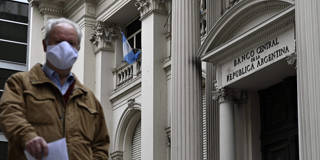It is no secret that Argentina has a debt-sustainability problem, which is why its government has gone to such lengths to work with the International Monetary Fund on a solution. But, rather than recognizing that COVID-19 has complicated matters, Argentina's private-sector creditors continue to stand in the way.
LONDON – Last month, Argentina technically defaulted on its debt, following a 30-day grace period for the latest interest payments. Needless to say, sovereign defaults can have enormous economic and social costs. Whether Argentina will be spared the worst of them now depends critically on the negotiations that are still ongoing between the country’s government and its private-sector creditors.
Not all countries were equally prepared to confront the COVID-19 crisis. Argentina, for its part, had a significant debt-sustainability problem long before the pandemic arrived. Even the International Monetary Fund has said as much, affirming in February that, “The primary surplus that would be needed to reduce public debt and gross financing needs to levels consistent with manageable rollover risk and satisfactory potential growth is not economically nor politically feasible.”
That statement was issued before COVID-19 had become a pandemic and triggered a global recession. Conditions since then have exacerbated Argentina’s longstanding problems, especially as it has become increasingly clear that the recession will be deeper, and the recovery more protracted, than initially expected.

LONDON – Last month, Argentina technically defaulted on its debt, following a 30-day grace period for the latest interest payments. Needless to say, sovereign defaults can have enormous economic and social costs. Whether Argentina will be spared the worst of them now depends critically on the negotiations that are still ongoing between the country’s government and its private-sector creditors.
Not all countries were equally prepared to confront the COVID-19 crisis. Argentina, for its part, had a significant debt-sustainability problem long before the pandemic arrived. Even the International Monetary Fund has said as much, affirming in February that, “The primary surplus that would be needed to reduce public debt and gross financing needs to levels consistent with manageable rollover risk and satisfactory potential growth is not economically nor politically feasible.”
That statement was issued before COVID-19 had become a pandemic and triggered a global recession. Conditions since then have exacerbated Argentina’s longstanding problems, especially as it has become increasingly clear that the recession will be deeper, and the recovery more protracted, than initially expected.